In this article:
High blood pressure, or hypertension, is one of the most common ailments people suffer from all over the world.
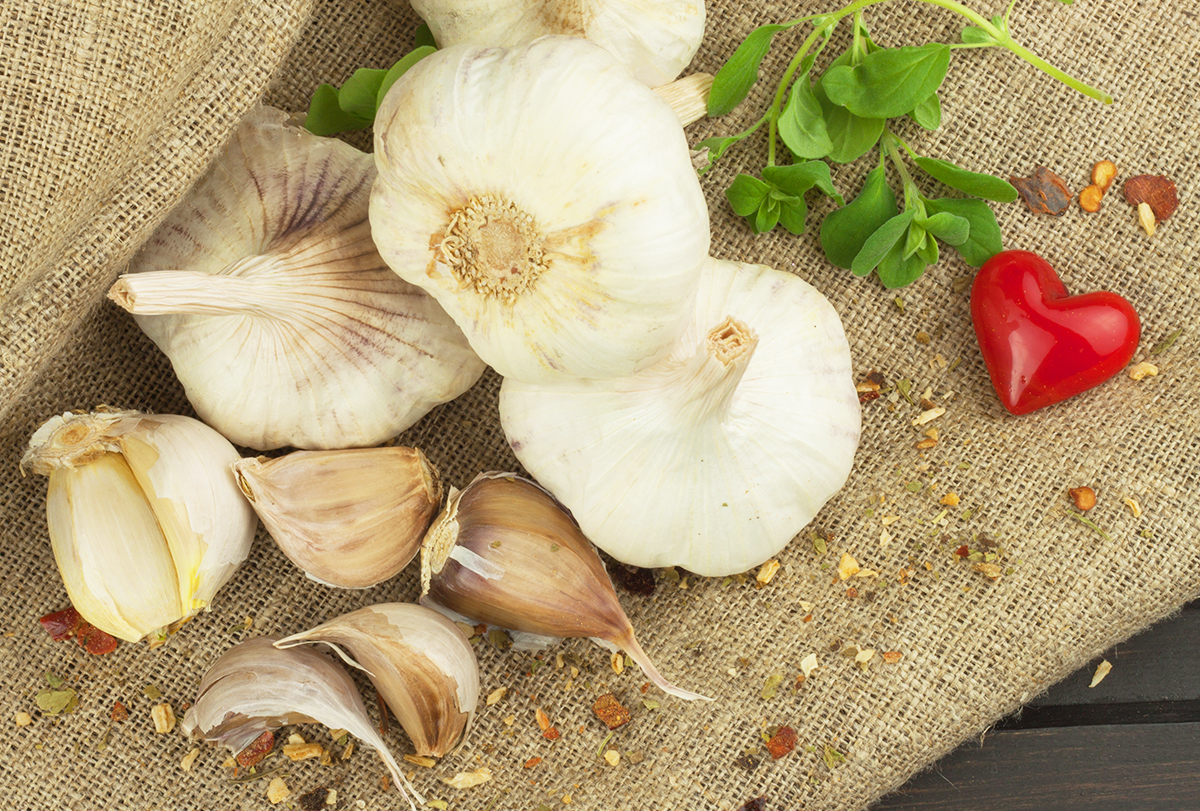
High blood pressure occurs when the flowing blood exerts long-term pressure against the walls of the arteries. If left untreated or unmanaged for a long time, it can cause several other complications including heart attacks.
Blood pressure is measured using two numbers written in fraction form. The number that shows first is systolic blood pressure, which measures the pressure exerted against the walls of the arteries when the heart beats, and the other number appearing second is referred to as diastolic blood pressure, which measures the blood pressure when the heart is at rest between beats.
The ideal normal blood pressure is 120/80 mmHg. (1)
According to the European Society of Cardiology/European Society of Hypertension: (1)
- A systolic BP of 120–129 mmHg and diastolic BP of less than 80 mmHg is classified as elevated BP.
- A systolic BP of 130–139 mmHg and/or diastolic BP between 80–89 mmHg is high.
- A systolic BP of 140–159 mmHg and/or diastolic BP of at least 90–99 mmHg is grade 1 hypertension.
- A systolic BP of 160–170 mmHg and/or diastolic BP of 100–109 mmHg is classified as grade 2 hypertension.
The treatment plan for hypertension includes medications and dietary modifications.
Moreover, several herbs and spices have been identified for their potential in managing elevated blood pressure at home in long-term treatments.
Herbs and Spices for High Blood Pressure
Here are some plant ingredients that may help in the management of high blood pressure.
1. Garlic
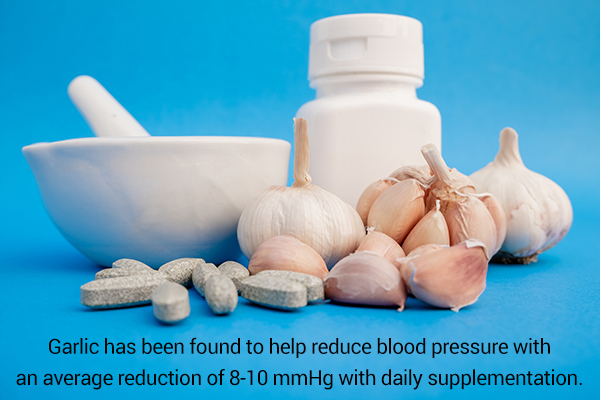
Garlic is used in many cuisines and has numerous health benefits. It holds medicinal value in many alternative medicines. The sulfur compounds present in garlic such as allicin may be responsible for garlic’s benefits. (2)
Multiple studies have indicated the benefits of garlic for reducing high blood pressure with an average reduction of 8–10 mmHg with daily supplementation, whether alone or in combination with other medications. (3)
In addition, aged garlic extracts of the brand Kyolic have been identified as having the potential to reverse the aging of arteries and making them healthy. The product is also effective in reducing cholesterol and normalizing blood thickness. (3)
How to consume:
Garlic capsules containing 400 mg of garlic are recommended to be taken twice a day. (2)
2. Celery seed
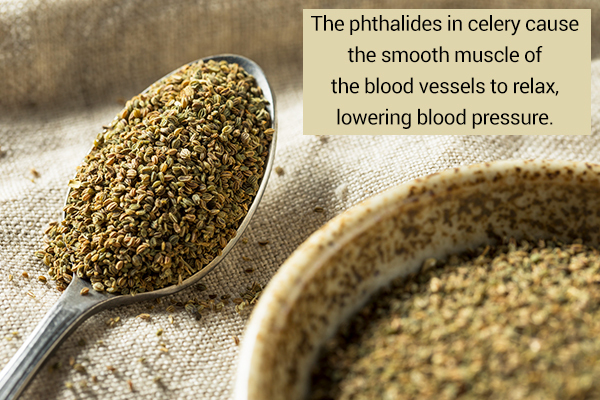
Celery, belonging to the parsley family, is a rich source of antioxidants that lend it several health benefits. In addition, it is a rich source of potassium, the inclusion of which in the diet has been shown to reduce blood pressure. (4)
The phthalides in celery also cause the smooth muscle of the blood vessels to relax, lowering blood pressure. (5)
How to consume:
Taking 75 mg of celery seed extract (available as a supplement) twice a day has been known to reduce hypertension in humans within 6 weeks. (4)
3. Black seed
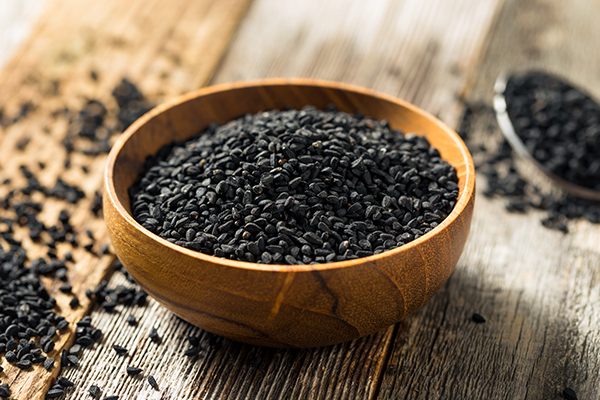
Black seed (Nigella sativa) holds its place of importance in alternative medicine. Useful for several conditions, it helps improve high blood pressure by relaxing the muscles of the arteries. It also has some anti-inflammatory functions.
In one study, consumption of 100–200 mg of black seed oil extract reduced systolic blood pressure by 10.6 mmHg and diastolic blood pressure by 9.6 mmHg in males with mild hypertension. (6)
In another clinical study, 2 g/day of black seeds reduced systolic and diastolic blood pressure significantly. (7)
How to consume:
Take 2 g of seed per day either by chewing or as toppings on meals. Black seeds do not have a disagreeable taste and can be had by themselves.
4. Cinnamon
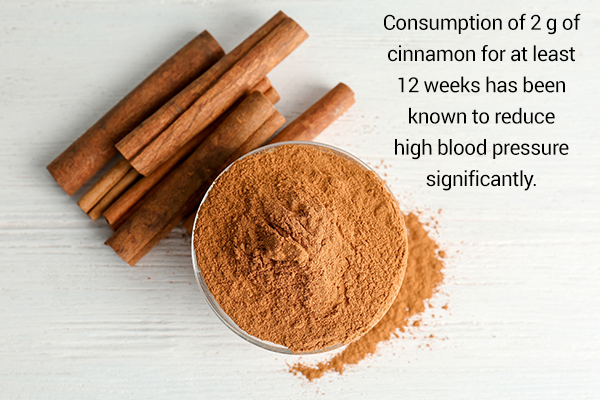
Cinnamon, which comes from the bark of the Cinnamomum tree, is a spice favored for its flavor in both savory and sweet dishes.
Cinnamon supplementation has been known to reduce systolic blood pressure by 6.23 mmHg and diastolic blood pressure by 3.93 mmHg. (8)
How to consume:
Consumption of 2 g of cinnamon for at least 12 weeks has been known to reduce high blood pressure significantly. (8)
5. Parsley
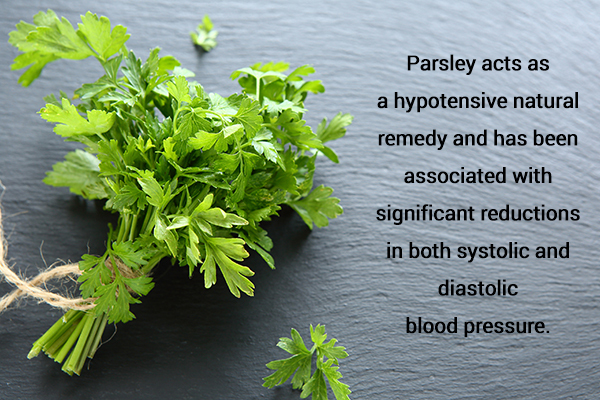
Parsley is a common herb used in many Middle Eastern dishes as toppings and garnish and to make side dishes.
In 2019, a study to evaluate the effectiveness of parsley as a hypotensive natural remedy was conducted. Significant reductions in both systolic and diastolic blood pressure were observed. It also relaxed the walls of blood vessels. (9)
Patients with high blood pressure in Turkey reportedly used parsley juice to maintain blood pressure. (10)
How to consume:
- Parsley tea made by steeping a fistful of parsley leaves in hot water is a great way to include parsley in your diet.
- You can also add parsley to your meals as toppings or use it to prepare dips alongside garlic and lemon juice.
6. Ginger
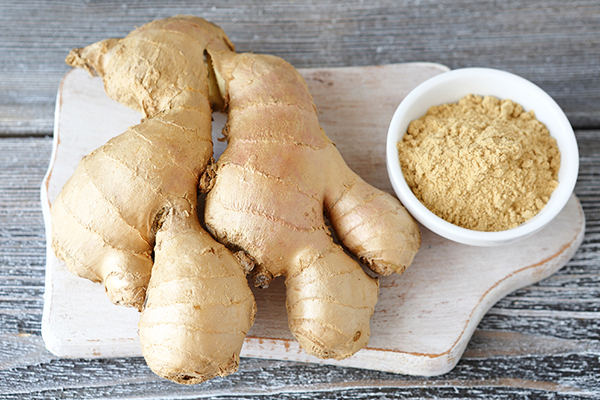
Ginger root has been popularly used to reduce nausea and indigestion. Used in many types of alternative medicine, it is also effective against high blood pressure.
A review of many trials and studies found ginger to effectively reduce systolic blood pressure (by 6.36 mmHg) and diastolic pressure (by 2.12 mmHg). (11)
Ginger exerts its benefits by blocking calcium channels and relaxing the blood vessels to ease the pressure exerted by the flowing blood. (12)
How to consume:
- Ginger consumption of 3 g or less has been found to be effective. (11)
- Ginger can also be made into tea or used in cooking.
7. Basil
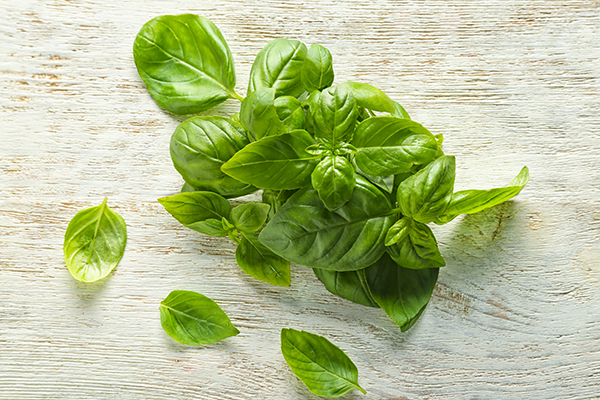
Basil leaves have two main varieties: sweet basil and holy basil. Both varieties have been studied for their impact on high blood pressure.
One study found that 30 ml of holy basil juice significantly reduced systolic blood pressure. (13) It also improved lipid profile.
Another study found sweet basil to reduce blood pressure in rats. It also relaxed the muscles of the arteries and proved to be an effective antioxidant. (6) However, more extensive studies and human trials are needed to find the pathway by which basil reduces blood pressure.
How to consume:
- Basil extracts in the form of pills and capsules are widely available and can be taken as per dosage instructions.
- Tea can be made by steeping 3–4 basil leaves in a cup of hot water.
8. Hibiscus
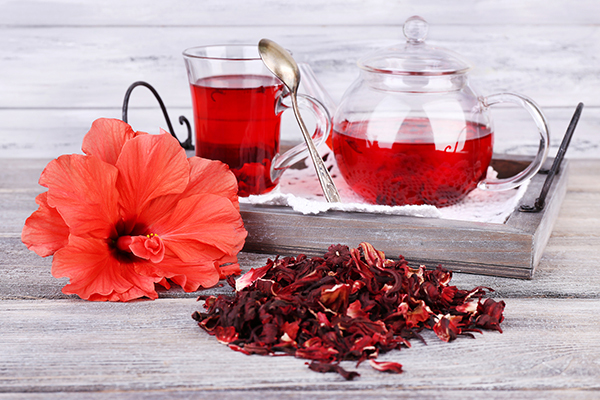
The flower of the plant of the mallow family is very potent and offers several medicinal benefits. Rich in antioxidants due to its vibrant red color, hibiscus finds its use in lowering high blood pressure.
Drinking tea made from hibiscus lowers blood pressure by causing the release of nitric oxide, which is responsible for the contraction of blood vessels. The nitric oxide is then filtered out through the urine. (14)
In a study, drinking 480 ml of hibiscus tea each day reduced systolic blood pressure by 7.43 mmHg and diastolic blood pressure by 6.70 mmHg. (14)
How to consume:
Hibiscus tea made from 2 g of dried hibiscus flower steeped in a mug of hot water for 3 minutes is the easiest way to consume this tea. The taste of this tea is a bit sour so honey can be added to sweeten the tea.
9. Carom seeds
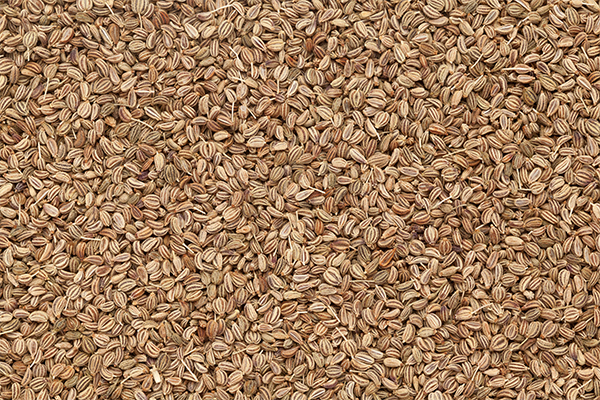
Carom seeds, or ajwain, are small seeds used in cooking and alternative medicine. They are often recommended for easing flatulence and indigestion.
Carom seeds are useful for hypertensives due to their calcium channel-blocking activity. (6) Calcium channel blockers are medications given to manage hypertension, and they work by preventing calcium from entering the cells of the heart and causing them to relax.
One study revealed that extracts of carom seeds reduced the blood pressure and heart rate in rats with normal blood pressure. (6)
How to consume:
- Soak 1–2 teaspoons of carom seeds in a cup of water overnight and drink it the next morning along with the seeds.
- Tea can also be made by boiling 2 teaspoons of carom seeds in a cup of water. It can be combined with other ingredients such as basil and ginger to make it more effective.
Precautions to Consider
A lot of studies have been conducted to establish the ways in which these herbs and spices may be beneficial in reducing blood pressure.
However, reduction of blood pressure by using natural remedies is highly dependent on other factors such as age, diet, degree of hypertension, other clinical conditions such as diabetes or obesity, and physical activity.
It is highly advisable not to rely solely on these remedies as there is no one way in which these ingredients act. Moreover, most supplements marketed as natural remedies do not have FDA approval.
Thus, consulting your doctor is very important before including anything new in the management of blood pressure.
Most-Asked Questions
Can I lower blood pressure without medication?
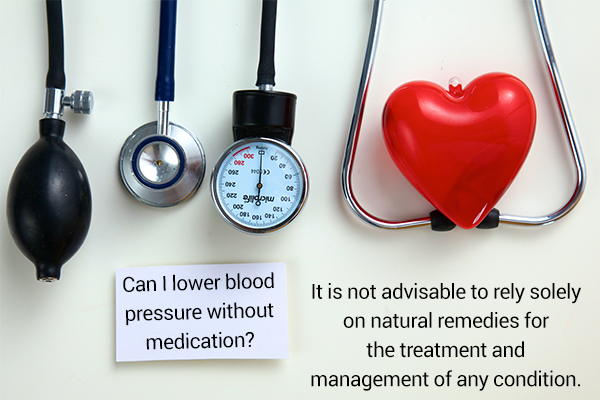
It is not advisable to rely solely on natural remedies for the treatment and management of any condition.
Dietary modifications such as lowering the consumption of sodium-rich foods and increasing fruit and vegetable intake, taking doctor-prescribed medication, and physical activity all work together to reduce high blood pressure.
Can I take more than the recommended dose of herbs and spices to increase the effect?
Studies haven’t established the toxicity of overconsumption of natural remedies. However, anything in large quantities is not good. Therefore, it is advisable to stick to recommended doses after consulting your doctor.
Final Word
Hypertension is a bothersome health condition that impacts your day-to-day activities. But it is also a manageable condition by using medications, making dietary changes, and increasing physical activity.
Natural remedies such as using herbs and spices act as adjuncts to medication, making hypertension management easy. As the toxicity of overdosing has not been studied, it is better to stick to the recommended doses and not to consume more than suggested.
Finally, natural remedies are not meant to replace medication, as some people may have severe hypertension that is not manageable without medication. It is only meant to be a part of a treatment plan to manage high blood pressure.
- Was this article helpful?
- YES, THANKS!NOT REALLY


